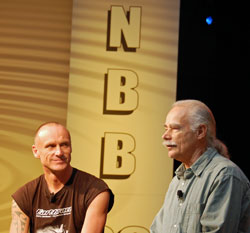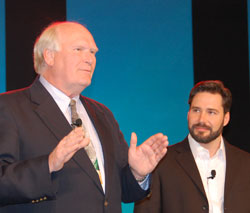 Several more awards were presented on the last day of the National Biodiesel Conference this week in San Francisco.
Several more awards were presented on the last day of the National Biodiesel Conference this week in San Francisco.
As the Inspiration award winners, Bryan Peterson (right) and Pete Bethune shared their inspiring stories at the final general session. Fourteen years ago, Peterson made his way around the world in a small boat powered by biodiesel. He completed the 35,000 mile, two year trip in a boat called Sunrider. Peterson’s successful adventure generated some of the earliest news on biodiesel, and it paved the way for a world record last year. More recently, New Zealander Pete Bethune made headlines for breaking the world speed record for circumnavigating the globe in his Earthrace expedition in 60 days. Both men’s biodiesel message circumnavigated the globe with them.
Listen to an interview with Bryan and Pete here: [audio:http://www.zimmcomm.biz/nbb/nbb-09-pete-bryan.mp3]
 National Biodiesel Board CEO Joe Jobe (right) presented the Pioneer Award – a special honor to an individual or group who has served the industry – to Kenlon Johannes, the first Executive Director of the National SoyDiesel Development Board, which later would become the NBB.
National Biodiesel Board CEO Joe Jobe (right) presented the Pioneer Award – a special honor to an individual or group who has served the industry – to Kenlon Johannes, the first Executive Director of the National SoyDiesel Development Board, which later would become the NBB.
Johannes, a soybean farmer when he represented the board, continues to promote biodiesel through the Kansas Soybean Commission.
Listen to an interview with Kenlon here: [audio:http://www.zimmcomm.biz/nbb/nbb-09-kenlon.mp3]
Last but not least, San Francisco Mayor Gavin Newsom was presented with the NBB Inspiration award for his work in helping to make his city by the bay the largest known city in the world to use B20 fleet-wide. In 2006, Newsom issued an Executive Directive designed to increase the pace of municipal use of biodiesel. Today, virtually all of the City’s 1,500 diesel vehicles run on B20.


 Farmers in Pennsylvania could soon be earning carbon credits for burning a clean fuel that they help grow right on those farms.
Farmers in Pennsylvania could soon be earning carbon credits for burning a clean fuel that they help grow right on those farms. An American company that moves fuels and runs terminals has successfully tested a biodiesel pipeline in the Southeastern United States, joining the firm’s efforts of moving ethanol through another pipeline in the South.
An American company that moves fuels and runs terminals has successfully tested a biodiesel pipeline in the Southeastern United States, joining the firm’s efforts of moving ethanol through another pipeline in the South. The New York State Energy Research and Development Authority (NYSERDA) announced with a press release that The Pace Energy and Climate Center has been selected to develop a renewable fuels roadmap and sustainable biomass feedstock study that will help guide New York State policy on renewable fuels. The Roadmap was one of several recommendations from Governor David Paterson’s Renewable Energy Task Force report issued in 2008. The project is co-sponsored by the New York State Departments of Environmental Conservation and Agriculture and Markets; who along with NYSERDA will oversee the development of the Roadmap.
The New York State Energy Research and Development Authority (NYSERDA) announced with a press release that The Pace Energy and Climate Center has been selected to develop a renewable fuels roadmap and sustainable biomass feedstock study that will help guide New York State policy on renewable fuels. The Roadmap was one of several recommendations from Governor David Paterson’s Renewable Energy Task Force report issued in 2008. The project is co-sponsored by the New York State Departments of Environmental Conservation and Agriculture and Markets; who along with NYSERDA will oversee the development of the Roadmap.  I’m sitting in artic Tennessee and feel like I’m an extra in the movie
I’m sitting in artic Tennessee and feel like I’m an extra in the movie Most celebrities are out tooling around in their vegetable cars touting biodiesel, and rarely out in their flex-fuel vehicle (FFV) touting E85. (Maybe its because driving with grease is sexier than driving with corn.)
Most celebrities are out tooling around in their vegetable cars touting biodiesel, and rarely out in their flex-fuel vehicle (FFV) touting E85. (Maybe its because driving with grease is sexier than driving with corn.) Singer/song writer Melissa Etheridge is the latest star to show her support for biodiesel, appearing Tuesday at the
Singer/song writer Melissa Etheridge is the latest star to show her support for biodiesel, appearing Tuesday at the  The world’s largest retailer has increased the efficiency in its private fleet by 25 percent over the last three years, reducing carbon dioxide emissions and fuel use… and it wants to get even greener in the years to come.
The world’s largest retailer has increased the efficiency in its private fleet by 25 percent over the last three years, reducing carbon dioxide emissions and fuel use… and it wants to get even greener in the years to come.